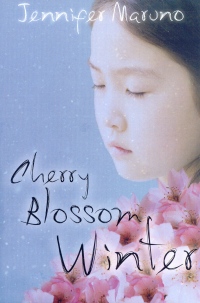| ________________
CM . . . . Volume XVIII Number 32 . . . . April 20, 2012
excerpt:
Cherry Blossom Winter, a sequel to Jennifer Maruno’s When the Cherry Blossoms Fell (CM, Vol. XVI, No. 11, Nov. 13, 2009), resumes the story about the internment of British Columbia’s Japanese-Canadians during World War II. Maruno continues to follow 10-year-old Michiko Minigawa and her family as they negotiate the twists and turns their lives are forced to take by the government of British Columbia. The latest injustice the family has been handed is an official letter informing them everything they worked to obtain and owned in Vancouver has been sold, and they can expect essentially none of the proceeds. Michiko’s aunt, Sadie, is outraged, but Michiko’s geechan (grandfather) believes that what is done is done, and there is nothing to be gained by dwelling on the past. On top of that, Michiko’s friend, Kiko, later informs Michiko that the Japanese families that have been relocated to BC’s interior are going to be forced to move again, this time to Japan or eastern Canada. The news spins Michiko’s family into another dilemma as her father opts for Japan and her mother is equally determined she and the children are Canadian and are going to remain so. Along with Michiko’s family’s problems, Kiko sometimes behaves in ways Michiko cannot understand. One act in particular causes a rift between the girls as Michiko confronts Kiko about a serious wrong she has committed and tries to find a way to right it without leading to more trouble. In the end, Michiko discovers Kiko is carrying a hard secret. In this coming-of-age book, Maruno develops strong central characters and multiple plot lines. Her author’s note tells us she relies on information given to her by her mother-in-law for authentic details of life as it was in an internment camp, and for glimpses into Japanese traditions and beliefs that were held onto during a time when marginalized immigrants worked hard to become full participants in Canadian society and struggled to balance two identities—a theme that continues to exist today. That struggle becomes Michiko’s when she realizes her grandfather’s and parents’ oft-repeated dictum that children should “stick to kid business” and not concern themselves with adult issues has left her woefully ignorant of family business that has affected her life in the past and is now threatening to cut her out of decisions that will forever affect her future. Spurred on by Kiko, whose guardian puts out the Japanese newspaper in their small community (and thus Kiko is at least partially informed about almost all of the adult business affecting the community), Michiko’s awareness develops slowly and is the more credible for it. At the same time, her connection to her grandfather and his influence on her are never left behind, even after his death. Cherry Blossom Winter is a book about the deep roots of traditions, core family values, and successful relationships, as much as it is about a government’s betrayal of a people who helped to build a province, and Michiko is a likeable character readers will be happy to follow, wherever she goes. A satisfying read. The Japanese vocabulary and glossary at the back of the book that explains it will perhaps be an added point of interest for some. Highly Recommended. Jocelyn Reekie is a writer, editor and publisher in Campbell River, BC.
To comment
on this title or this review, send mail to cm@umanitoba.ca.
Copyright © the Manitoba Library Association. Reproduction for personal
use is permitted only if this copyright notice is maintained. Any
other reproduction is prohibited without permission.
NEXT REVIEW |
TABLE OF CONTENTS FOR THIS ISSUE
- April 20, 2012.
AUTHORS |
TITLES |
MEDIA REVIEWS |
PROFILES |
BACK ISSUES |
SEARCH |
CMARCHIVE |
HOME |
